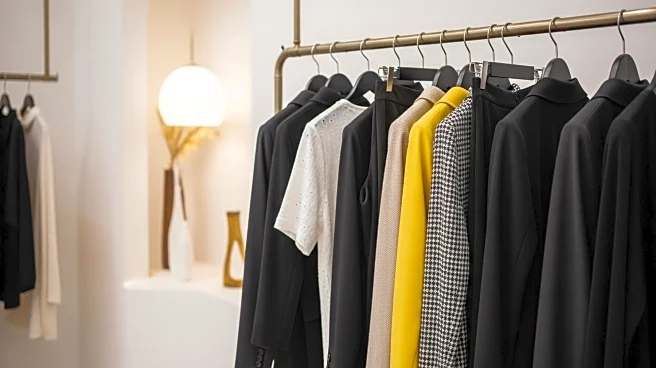What's Happening?
A.k.a. Brands, led by CEO Ciaran Long, is focusing on a demand-driven approach to fashion, distinguishing itself from fast fashion by prioritizing quality and customer responsiveness. The company, which includes brands like Princess Polly, Culture Kings, Petal & Pup, and Mnml, introduces approximately 150 new styles weekly, adapting quickly to consumer trends. This strategy involves initially producing small quantities and expanding successful products, as demonstrated by the Petal & Pup Betina dress, which grew from 100 units to 15,000 units across multiple colorways. A.k.a. Brands is also expanding its physical retail presence, with plans to open additional stores following the success of its first Princess Polly store in Los Angeles and Culture Kings in Las Vegas.
Why It's Important?
The demand-driven model adopted by A.k.a. Brands reflects a significant shift in the fashion industry towards more agile and responsive production methods. This approach allows the company to cater to the preferences of Gen Z consumers, who value newness and trend alignment. By expanding its brick-and-mortar presence, A.k.a. Brands is positioning itself to capture a larger market share and enhance customer engagement. This strategy could influence other retailers to adopt similar models, potentially reshaping the retail landscape and consumer expectations regarding fashion delivery and quality.
What's Next?
A.k.a. Brands plans to continue expanding its retail footprint, with eight to ten new store openings anticipated next year. This expansion is part of the company's strategy to increase its physical presence and directly engage with customers. As the company invests in its retail operations, it may face challenges related to capital allocation and market competition. The success of this strategy will likely depend on its ability to maintain quality while rapidly responding to consumer trends. Other retailers may observe A.k.a. Brands' approach and consider similar strategies to enhance their market position.
Beyond the Headlines
The shift towards demand-driven fashion production raises questions about sustainability and ethical practices in the industry. While this model reduces waste by aligning production with consumer demand, it also necessitates rapid manufacturing processes that could impact labor conditions. As A.k.a. Brands expands its retail presence, it may need to address these ethical considerations to maintain consumer trust and brand integrity. Additionally, the focus on Gen Z preferences highlights the growing influence of younger consumers in shaping industry trends and practices.








